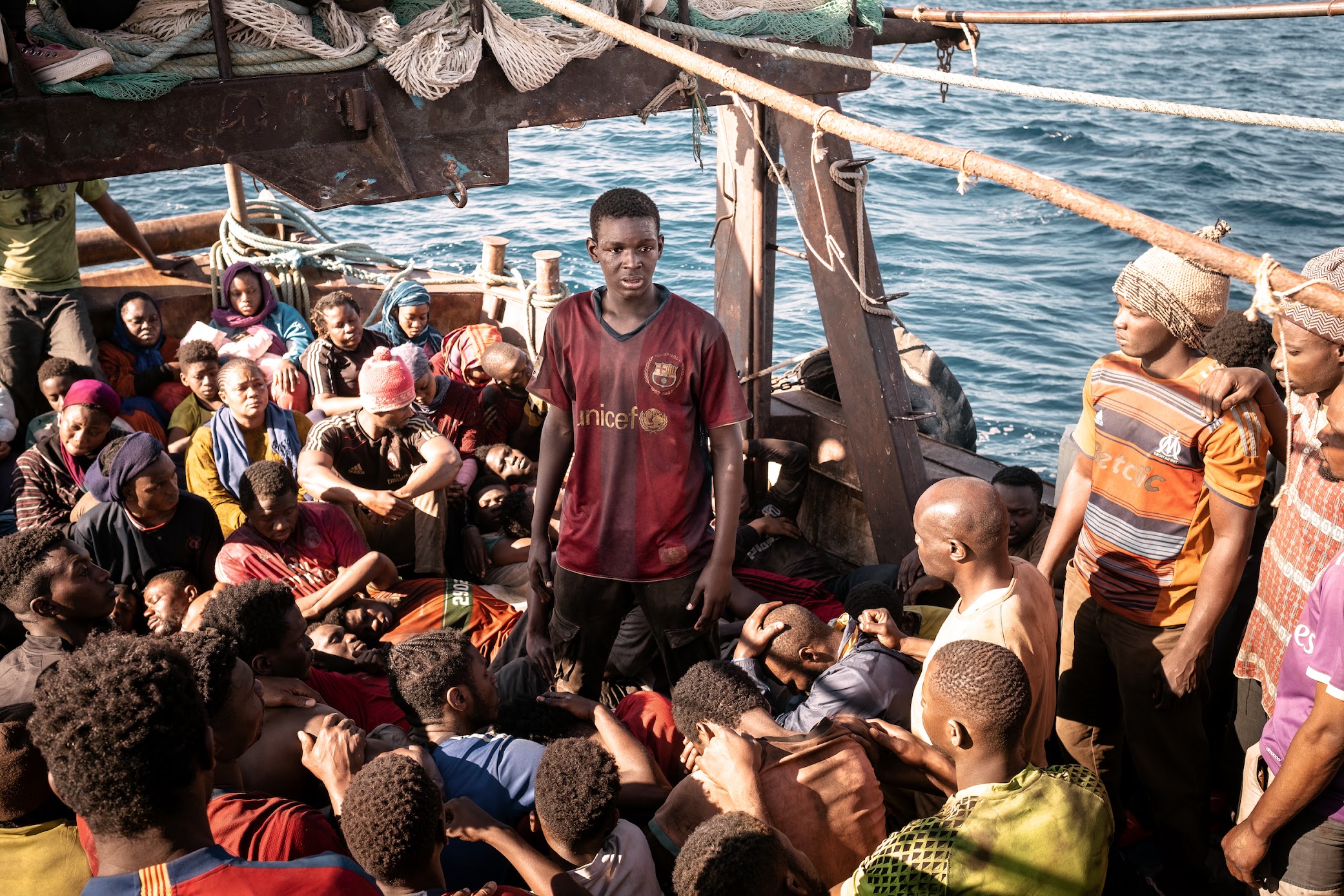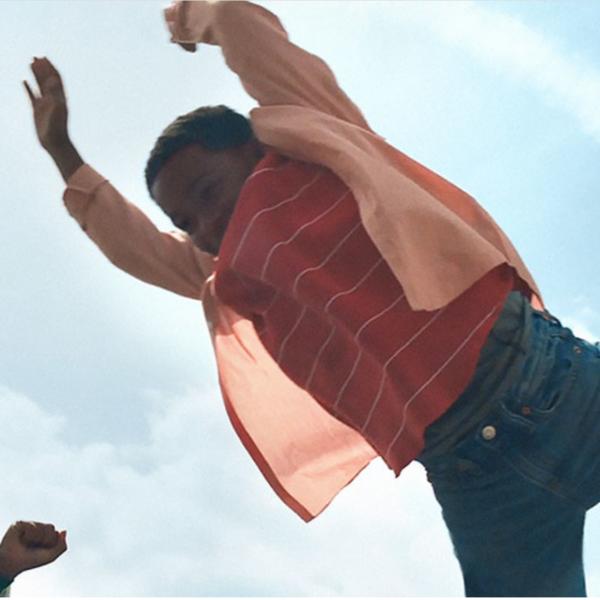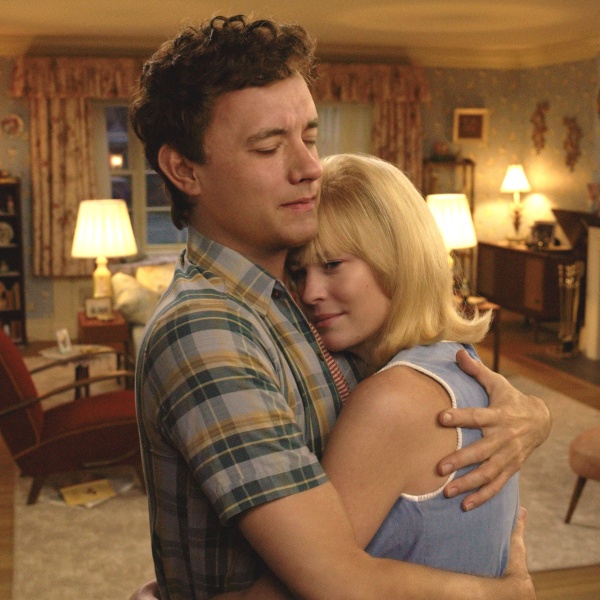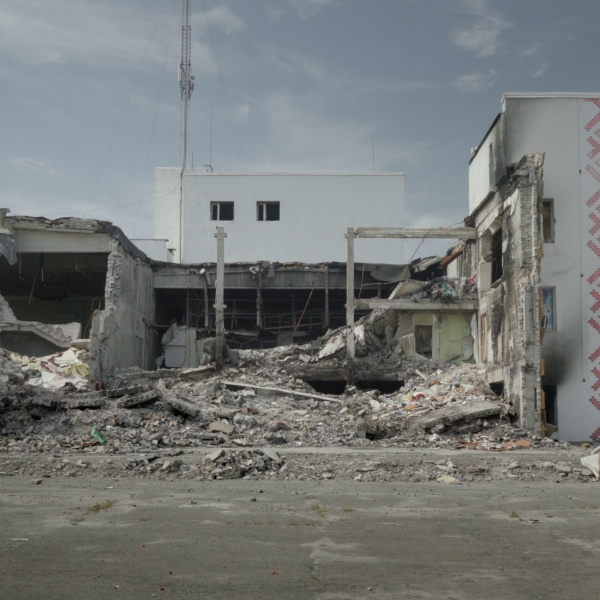
Had first-time Senegalese actors Seydour Sarr and Moustapha Fall seen a Matteo Garrone film like “Gomorrah” before being scout-cast in his Italian Oscar nominee “Io Capitano,” they might’ve blinked twice. The 2008 film followed two teens from the Campania slums and into a life of organized crime, ending with them both dead in the mouth of a tractor. “Io Capitano” also follows two teens on a journey — here as African refugees making their way from Dakar to Europe in search of adventure — and as with Garrone’s crowning movie, the Italian filmmaker did not share the full script with his non-professional actors. In other words, Sarr and Fall, who in “Io Capitano” play cousins, had no idea whether their characters would survive the journey across the Mediterranean Sea. (I won’t tell you, though I will say “Io Capitano” is based on a true story of a young Senegalese man who captained a boat of exhausted emigrants from Tripoli to Italy.)
Their voyage to Europe is marked by great danger and peril that Garrone masterfully stages and never dilutes — including a final scene on a migrant boat in which the passengers clamoring to escape were played by actual migrants who lived this experience. “Io Capitano” marks, surprisingly, Garrone’s first Academy Award nomination for Best International Feature. (The poignant refugee drama, while representing Italy, is told in Wolof, a language of West Africa.) The Venice Silver Lion Best Director winner has never even been shortlisted despite Italy previously submitting both “Gomorrah” and 2018’s “Dogman.”
What clicks this time is that “Io Capitano,” gorgeously wrought on location in the Sahara desert and on the choppy waters of the Mediterranean, is a universal and ultimately hopeful story (not without its bruises, though) that Garrone has taken out to the world, and even into corners of the African continent where cinemas are scarce, to tell a mirror inverse of the sorts of refugee stories we see onscreen. Rather than frame Seydou (Sarr) and Moussa’s (Fall) journey as a desire to escape poverty or war, they’re TikTok-savvy Gen Zers with ambitions of fame and stardom chasing the storied cosmopolitan experience of Europe — though Garrone gives us no indication of the precise world, certainly a fractious one with a right-wing Prime Minister in Italy, they’re about to step into.
“Io Capitano” held a qualifying run in the U.S. last fall before Cohen Media Group opens the film in U.S. theaters properly on February 23. IndieWire spoke with the filmmaker, a jovial and generous speaker who has remained geographically and emotionally close to his actors as we discuss below, over Zoom.
This interview has been edited and condensed for clarity.
IndieWire: You didn’t share the full script for “Io Capitano,” which you wrote with Massimo Gaudioso, Massimo Ceccherini, and Andrea Tagliaferri, with your first-time actors. More seasoned performers might feel manipulated by this approach.
Matteo Garrone: It depends on the actor. It never happened where they asked me for the script, and I said, “No, I won’t give it to you.” That wouldn’t be fair. Sometimes, I work with actors who have an academic or professional background, and they prefer to have the script, and I have no problem giving it to them. When I met Roberto Benigni for “Pinocchio,” I gave him the script with no problem. There are situations where I feel that the actor that doesn’t have an academic background can be helped with his interpretation, living the journey of the character. I create a wedding of the character and the person. That means that I help also the actor to give some aspect of his personality. For instance, Seydou and Moustapha, they love music and song, so this aspect of their personality entered the script to create a wedding between character and person. Both of them were dreaming about discovering the world, like the characters, about to arrive in Europe. I prefer to let them not know whether they would succeed or not.

You shot the film over 13 weeks in chronological order across the Saharan desert, Casablanca, and Morocco. How did filming in order help the actors?
Garrone: The most important thing for the actors was shooting chronologically. I couldn’t arrive to the close-up at the end if I shoot that close-up the second week. That’s the end of the journey.
Seydou really changed. He was shy at the beginning [of the shoot], he was as kid, and then he became a man. So it was really important for me to shoot chronologically. They lived this journey without feeling manipulated. Also, when they live the journey day by day, they can also help you, me in this case, to verify if what we wrote goes in the right way. The script is always a project. We wrote, listening to stories of real migrants, and so we wanted to remain faithful to this story. But at the same time, we wanted Moustapha and Seydou to live that journey with authenticity. They’ve been helped a lot by the real migrants in the movie, because all the extras in the movie are real migrants who made that odyssey. They spent two months sharing with them, eating together, talking, so they discover something they didn’t know before.
Moustapha once said, in a Q&A, he said that when he knew about the movie, he knew the crew was Italian, so he was thinking we’d go to Italy, so there will be fashionable dress. Then when he started to have these clothes, very old and dirty, he was so disappointed because he didn’t know the story. He thought, “Italy! Fashion!”
You pivoted from trying to cast Senegalese actors based in Europe to actually looking at kids in Dakar. How did you get Seydou and Moustapha to trust you and feel comfortable telling the story?
Garrone: At the beginning, they accepted the role without knowing anything about me or the movie because there was an opportunity to travel and discover the world, like the characters, to make money for their families. They didn’t know about me, or the movies that I’d done. It was a good opportunity. Then, they discovered, step by step, what they were doing. At the beginning, the first time I met them in Dakar after watching all the casting from Italy, Moustapha was supposed to be the leading role and Seydou the co-star. When I met them in person, I realized that Seydou was much closer to the leading role. I started to talk to them. There was the mother, then the sister of Seydou, and I was trying to explain with a translator a little bit about the movie. They were watching me very seriously. It was very tough for me to create a relationship because of the language. I was from another culture. I remember I felt very uncomfortable, like I was missing something, the possibility to have a [rapport]. I said, I don’t know how I will make it. Then we started to rehearse, and slowly, we started to create a relationship, a friendship. I became a sort of father, and now, they live in the house of my mother in Italy.

Seydou and Moustapha weren’t familiar with your work, but did you have them watch any films to get in the mode of their performances?
Garrone: I wanted to leave them pure. What I loved was the fact that they didn’t have structure. They were pure completely. When they were acting, they live the emotions from inside, never showing how good they are at technique. They suffer in some scenes. The mother, at the beginning, when she cries, that really happened. When I said stop, she was feeling bad. She didn’t want to cry, but it was something true inside. Often, with Seydou, he lived and suffered for real in making this interpretation. I loved the fact that every time they were never narcissistic. Sometimes, with actors in Europe, every opportunity, when you cry or shout, is an opportunity to show how good you are at acting. Maybe you get a prize. I never felt this with them.
Has their attitude changed at all now that they’re joining you on the road for the film’s awards campaign?
Garrone: It’s funny now that we are in the campaign for the Oscar. We were at the Golden Globes. Joaquin Phoenix loved the performance. He said, “You were great as Seydou.” He had no idea who Joaquin Phoenix was. For instance, Sean Penn invited us to dinner at his house in Malibu, and he said beautiful things about the interpretation of Seydou, and he didn’t know who Sean Penn was. They pass through, and that’s part of the power of that character. He’s innocent.

They’re lucky in some ways to not know what awards season is.
Garrone: [At the Golden Globes], there was Steven Spielberg 10 meters away, and they didn’t know it was Spielberg. [Sarr and Fall] keep this element of naivete that I liked. I don’t know about the night of the Oscars, we’ll see, but I’m confident they’ll pass through like they did in other situations, watching without changing their way of being. It’s funny because Seydou did an interview in Italy. The house of my mother is close to Rome, in front of the beach, 30 minutes from Rome, in a town called Fregene. The title was “Los Angeles Scares Me, I Fregene.”
Will you want to collaborate again since you now live so close to each other?
Garrone: At the moment, I have no idea about my next project. After “Io Capitano,” many time they asked me to do a sequel because it could be a new odyssey from the moment when they arrive [in Europe]. I think I will take a break and start to think what could a new adventure for me. In this period, I’ve been supporting the movie from September, when we released in Italy, through the Oscar campaign. I never stop. I’m very happy and proud to make it. I met thousands of students in Italy. I always say how important this movie is that it will screen in schools because it’s a part of audiences who don’t see movies in theaters because they are not interested, maybe they think it’s boring. But when they see the movie, they realize immediately that behind what they see on television, there are kids like them. Same desires, same problems with their parents. The movie is very accessible, especially to the young, because it’s an Homeric fairy tale.
Have you been able to show the movie to audiences in Africa?
Garrone: The movie has been released in 20 countries in Africa. There are a lot of young audiences who see the movie in Africa so they can be aware about the risks. I don’t think a movie can stop their desire to discover the world or look for a better life because we didn’t say anything about the fact that the movie is not talking about migrants that escaped from war. They already start to live in our country because of social media. The images make a lot of promise, but we know the background. They don’t. They don’t understand why others can travel and come on holiday into their country and they can’t go there; they have to risk their lives. That’s something the students in Europe or the States don’t know, the privilege they have. It’s very important to show the consequence. We will go with a caravan, like the beginning of the cinema, in Senegal in a village where cinemas never arrived, and we will screen the movie.
Cohen Media Group opens “Io Capitano” in U.S. theaters on February 23, 2024.




